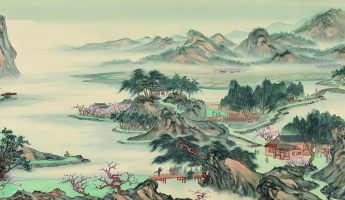The essence of traditional Chinese philosophy of life is rooted in the profound cultural heritage of the Chinese nation for thousands of years, and is the crystallization of countless predecessors’ life practices, social interactions, and wise reflections. With the changes in history and times, different value orientations lead to diverse life choices and evaluation systems. From the perspective of historical materialism, any cultural phenomenon has both historical and concrete significance, possessing both positive and negative values. Therefore, the mission of scientific research is to distinguish between “essence” and “dross”, aiming at sublating dross and inheriting essence. The following is an in-depth discussion of the essence of Chinese traditional philosophy of life from ten dimensions:
Firstly, pursue the ultimate ideal of life
In the diverse and interwoven philosophical system of traditional Chinese culture, the relentless pursuit of life ideals constitutes a powerful spiritual driving force. This pursuit, in short, is the yearning for the realm of truth, goodness, and beauty. Although Confucianism, Taoism, Mohism, Legalism, and Buddhism each have their own interpretations of truth, goodness, and beauty, their spiritual cores are interconnected. Confucianism regards the ideal of a great world where “the world belongs to all” as the ideal, Taoism pursues the state of “unity of body and Tao” with nature, Mohism is committed to “eliminating the harm of the world and promoting its benefits”, Legalism focuses on practicality, but also has its unique pursuit of truth, goodness, and beauty, while Buddhism guides sentient beings towards the ultimate Buddha nature of goodness and beauty through doing good deeds. These pursuits still have profound implications for contemporary ideal education and moral education.
Secondly, promote the spirit of perseverance, progress, and self-improvement
The Chinese nation has always been known for its perseverance and determination to forge ahead. The classic expression of this spirit in the Book of Changes is’ Heaven is strong, and a gentleman strives for self-improvement ‘. Confucius’ attitude of “forgetting to eat and forget to worry with joy” and Zengzi’s motto of “a heavy responsibility and a long road ahead” inspire future generations to constantly move forward, be brave in taking on responsibilities, and strive tirelessly.
Thirdly, pay attention to self-cultivation and cultivate one’s character, be content with poverty and enjoy the Tao
Chinese culture emphasizes self reflection and self-cultivation. Confucianism advocates “self reflection three times a day”, while Taoism advocates “contentment leads to happiness, reduce selfishness and desires”. This emphasis on inner cultivation is not only related to the improvement of personal morality, but also the cornerstone of realizing the value of life.
Fourth, prioritize harmony and conduct oneself in a moderate manner
The Confucian doctrine of the mean emphasizes harmonious coexistence, moderation, and avoidance of extremism. This philosophy not only helps to build good interpersonal relationships, but also serves as an important cornerstone for social harmony and stability.
Fifth, follow nature and guide according to the situation
Taoist philosophy advocates following nature and not acting recklessly. Laozi’s metaphor of “governing a great country like cooking small delicacies” vividly illustrates the wisdom of careful and cautious governance, and also has guiding significance for life and affairs.
Sixth, be aware of every detail and take preventive measures
The idea of “seeing the details and knowing the essence” contained in classics such as the Book of Changes emphasizes a keen insight into subtle changes to prevent potential crises. This forward-looking thinking is crucial for both personal growth and social governance.
Seventh, perceive the transformation of misfortune and fortune, and maintain clarity
Chinese culture excels in dialectical thinking and has a profound insight into auspiciousness, misfortune, and fortune. Laozi’s discourse of “relying on misfortune and fortune, and hiding fortune and misfortune” reminds people to be prepared for danger in times of peace and maintain a clear mind.
Eighth, be humble and courteous, leaving room for maneuver
Both Confucianism and Taoism emphasize humility in treating others and not being the first. This philosophy of life helps to reduce conflicts, enhance harmony, and leave room for personal development.
Ninth, be simple and willing to contribute
The Chinese nation is known for its diligence, frugality, and perseverance, and Mohism is a model of the spirit of hardship. The Confucian philosophy of “worrying before the worries of the world, and enjoying after the joys of the world” inspires generation after generation to selflessly dedicate themselves to the country and the nation.
Tenth, uphold individual dignity and have the courage to take responsibility
Although Chinese culture does not promote individualism like Western culture, it still respects individual personality. The heroic spirit of Confucianism, which states that “the three armies can seize the commander, but the individual cannot seize the will,” and the pursuit of freedom in Taoism all demonstrate individual dignity and the spirit of responsibility. The essence of these thoughts is of great significance for shaping an independent, tenacious and responsible personality.
The essence of Chinese traditional philosophy of life is not only a summary of past wisdom, but also a profound enlightenment to contemporary life. We should adopt the attitude of critical inheritance, select its essence, discard its dross, and constantly carry forward these valuable spiritual wealth.



